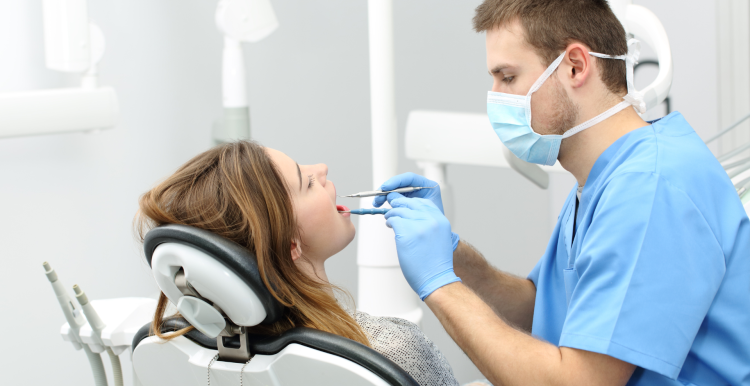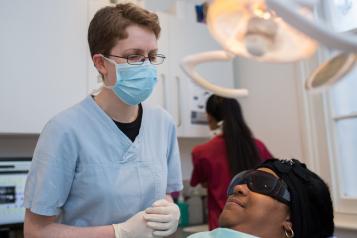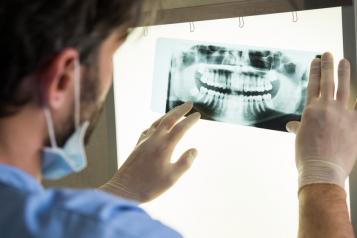Our position on NHS dentistry

Access to NHS dental care continues to be one of the main issues we hear about from the public. Difficulties getting support has led to many people living in pain. In some extreme cases, people take matters into their own hands, resorting to DIY dentistry.
Whilst some parts of England have better access, we know that people from the most deprived communities struggle the most to access dental care because they cannot afford it.
Although NHS England has made changes to the dental contract, we believe fundamental reform is needed to fix the issues.
Healthwatch evidence over the years
Healthwatch England has repeatedly warned that NHS dental care desperately needs reforming.
In 2022-23, dental care was the second most common issue people came to Healthwatch about, and a majority of the feedback we received was negative.
- 2021-22: 55% of dental feedback was negative in sentiment.
- 2022-23: 62% of dental feedback was negative in sentiment.
Our research has highlighted the extent to which this feedback is often linked to issues with access and cost.
Lack of access to NHS dentistry has been an issue for a long time
Lack of access to NHS dentistry has been an issue raised by local Healthwatch over a number of years. Initially, people in certain parts of the country – often areas of deprivation – regularly fed back concerns about the lack of available NHS dentist appointments.
The pandemic exacerbated issues – 7 in 10 found it hard to access support
During the pandemic, these problems were exacerbated. Between July and September 2020, 1,313 people from 142 council areas across England shared their experiences of NHS dentistry – compared with 238 over the previous three months. Seven in ten people (73%) found it difficult to access help and support when needed it, compared to just over one in ten (11%) who could access care easily.
People on low incomes and from minority ethnic backgrounds find it harder to afford treatment
In February 2021, over 2,000 adults in England responded to an online poll that Healthwatch England commissioned. Six in ten (61%) respondents felt that NHS dental treatments were expensive. We also found that people in lower socio-economic groups, and people from minority ethnic backgrounds found it harder to afford NHS dentistry, sometimes leading to them avoiding treatment.
Difficulties getting up-to-date information about practices taking on NHS patients
In December 2021, Healthwatch England reported on 8,019 people’s experiences of NHS dentistry between April 2020 and September 2021. Significant access problems were a key theme, including difficulties in getting up-to-date information about practices taking on new NHS patients. We heard consistent examples of people living with ongoing pain, but also extreme stories of people resorting to pulling out their teeth or using temporary fillings on a regular basis.
There is confusion about the relationship between a dental practice and patients. We heard cases where people considered that they were ‘registered’ with a dental practice but discovered that they had been ‘de-listed’ when they went to make an appointment. It is not clear to many people that being on a dentist’s ’list’ does not guarantee that they will be seen after a course of treatment has ended.
Even where appointments were available, people encountered problems. For example, we heard from several areas that families could only access NHS dentistry for their children if the parents paid for private appointments. Dental charges in general are confusing, particularly when it is not clear whether treatment – or part of it – is being delivered privately.
Impact of the cost of living
As the cost-of-living crisis gathered pace during 2022, research highlighted the impact this was having when combined with access issues in dental care.
- The majority of people (63%) found it difficult to book an NHS dental appointment;
- Of those who had had an appointment, nearly half (46%) had issues with the costs associated with their care;
- 38% of the respondents felt they were less likely to visit a dentist going forward;
- 21% of people who hadn’t had an appointment had suffered as a result, with the lack of access to dental care causing anxiety, or making it difficult to eat or speak.
The shortage of NHS appointments hit people on low incomes hardest. There was also a stark North-South divide – 20% of people living in the south of England said they could afford private dental care if necessary, compared with just 7% in the north.
Oral health problems for children
According to government statistics, the most common reason for hospital admissions among 6-10-year-olds is the removal of decayed teeth under general anaesthetic.
Children from the most deprived communities are almost four times more likely to be admitted for this reason than those from the most affluent areas.
In April 2023, Healthwatch England gave evidence to a parliamentary inquiry, highlighting that some children have never seen a dentist, storing up oral health problems for a new generation.
Some people have told us that their dental practices won’t see children on the NHS unless their parents sign up with the same practice as private patients.
Our evidence was given alongside a local Healthwatch representative who described difficulties for patients travelling miles outside a ‘dental desert’ to find NHS appointments.
Risk of a two-tier dental system
In November 2023, Healthwatch England's annual review of patient stories warned that:
More and more, we’re seeing a two-tier dental system, where those who can’t afford it can’t get the treatment they need.
We found the most common reason people told us they had used private care in the previous 12 months was that they could not find an NHS dentist.
Over two-thirds (69%) of people who accessed private dental care in the last 12 months had no dental insurance. Many are unable to afford private care, but feel they have no other options. Others are unable to afford even NHS dental care.
Yet NHS dental charges increased by 8.5% in April 2023, a much higher increase than for NHS prescriptions.
Our report also warned that dental access issues were impacting on vulnerable groups including young people with learning disabilities, as well adults with long-term conditions or a disability.
What we’re calling for
- Over the long-term, fundamental reform of how NHS dentistry is funded and arranged. The aim should be to allow the public to register with a local NHS dentist, in the same way they can with a GP surgery. This step would provide better access to appointments for preventative oral health and new urgent problems.
- Greater protection of dental budgets. We have seen NHS dental funding, which has not been spent, returned to central Government. Removing a budget ringfence in late 2023 has also seen funding used for non-dental health services so that integrated care systems can balance their books.
- Extra dental appointments should be made available for those who have not received NHS dental care in years, including children and those experiencing health inequalities. This should include a guarantee that child NHS appointments aren’t contingent on parents being private patients at the same practice.
- Freeze NHS dental charges this April, after last year's record 8.5% rise, and better promote to the public who is exempt from NHS dental changes, to support those who avoid seeking help because of costs.
- Greater clarity in the information about NHS dentistry to reduce public confusion that they have a right to be 'registered' with a dentist, when this is not the case. We also want to see every practice provide up-to-date online information so that people can clearly understand which services are taking on NHS dental patients and what they will be charged.
- More joined-up schemes between dental practices, GP surgeries, schools, and other services are needed to deliver prevention and link oral health to other issues, such as weight management and smoking cessation.
What action we’ve taken
Healthwatch England shared evidence of the dentistry crisis with the Chief Dental Officer’s team at NHS England, and the Department of Health and Social Care.
MPs frequently used this evidence in debates in the House of Commons and Westminster Hall to highlight the scale of the problem and the impact on individual people.
In January 2022, NHS England announced £50 million additional funding for dentistry. We’re pleased to see the Government and NHS England take action. However, more needs to be done as this is a fraction of what is required and didn’t reach all the areas in need.
On 19 July 2022, NHS England announced some changes to the dental services contract including:
- Improved payment to encourage dentists to take on more complex cases
- Flexibility about which dental professionals will be able to provide treatment, freeing up dentists’ time
- Where dentists do not deliver as many units of dental activity (UDAs) as their contact allows, the funding for unused capacity may be transferred to other dental practices that can provide additional appointments.
In December 2023 Healthwatch England attended a dentistry roundtable held by Andrea Leadsom, the primary care minister responsible for dentistry, to inform the government’s upcoming dental recovery plan and followed this up with a more detailed submission to the Department of Health and Social Care.
We will continue to monitor the feedback we receive to find out whether these changes are making any real improvement for people - particularly children as well as adults who require urgent treatment. We will continue to work with NHS England and the Government to ensure that people’s views are able to influence the future of NHS dentistry.

